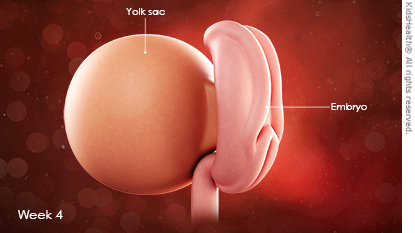
Spotting in the Fourth Week of Pregnancy: A Comprehensive Guide
Spotting during pregnancy, especially in the early stages, can be a common occurrence. While it can be alarming, it’s important to understand that spotting in the fourth week of pregnancy is not always a cause for concern. However, it’s crucial to seek medical attention if you experience any concerning symptoms or have any underlying medical conditions.
Causes of Spotting in the Fourth Week of Pregnancy
- Implantation Bleeding: This is the most common cause of spotting in the fourth week of pregnancy. It occurs when the fertilized egg implants into the lining of the uterus. Implantation bleeding is typically light and lasts for a few days.
- Cervical Changes: As the cervix undergoes changes during pregnancy, it can become more sensitive and prone to bleeding. This can lead to spotting after intercourse or a pelvic exam.
- Hormonal Fluctuations: The rapid hormonal changes during early pregnancy can cause spotting. These fluctuations can affect the blood vessels in the uterus, making them more likely to bleed.
- Infection: In some cases, spotting can be a sign of an infection, such as a urinary tract infection (UTI) or sexually transmitted infection (STI). It’s important to seek medical attention if you experience any other symptoms, such as pain, burning, or discharge.
- Ectopic Pregnancy: This is a rare but serious condition in which the fertilized egg implants outside the uterus, usually in the fallopian tube. Ectopic pregnancies can cause spotting and other symptoms, such as abdominal pain and vaginal bleeding.
When to Seek Medical Attention
While spotting in the fourth week of pregnancy is often not a cause for concern, it’s important to seek medical attention if you experience any of the following:
- Heavy bleeding or clotting
- Severe abdominal pain
- Fever or chills
- Foul-smelling vaginal discharge
- Signs of an infection, such as pain, burning, or discharge
- If you have any underlying medical conditions, such as a history of miscarriage or ectopic pregnancy
Diagnosis and Treatment
Your doctor will likely perform a physical exam and ask about your symptoms. They may also order tests, such as a blood test or ultrasound, to determine the cause of the spotting.
Treatment for spotting in the fourth week of pregnancy will depend on the underlying cause. If the spotting is due to implantation bleeding or cervical changes, it will typically resolve on its own. If the spotting is caused by an infection, your doctor will prescribe antibiotics. In rare cases, if the spotting is due to an ectopic pregnancy, surgery may be necessary.
Preventing Spotting in the Fourth Week of Pregnancy
While it’s not always possible to prevent spotting in the fourth week of pregnancy, there are some things you can do to reduce your risk:
- Avoid strenuous activity
- Get plenty of rest
- Drink plenty of fluids
- Eat a healthy diet
- Avoid smoking and alcohol
Conclusion
Spotting in the fourth week of pregnancy can be a common occurrence and is not always a cause for concern. However, it’s important to seek medical attention if you experience any concerning symptoms or have any underlying medical conditions. By understanding the causes and symptoms of spotting in the fourth week of pregnancy, you can help ensure a healthy pregnancy.